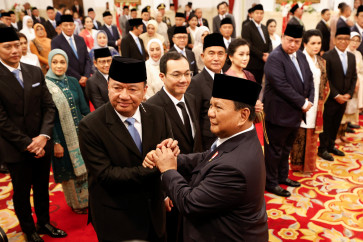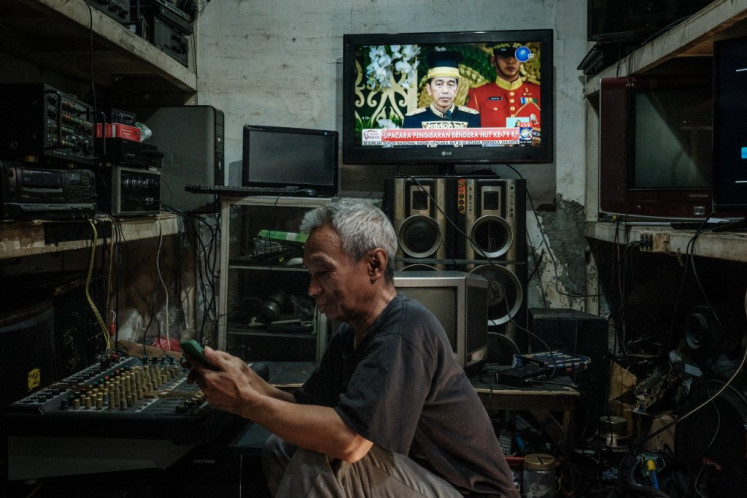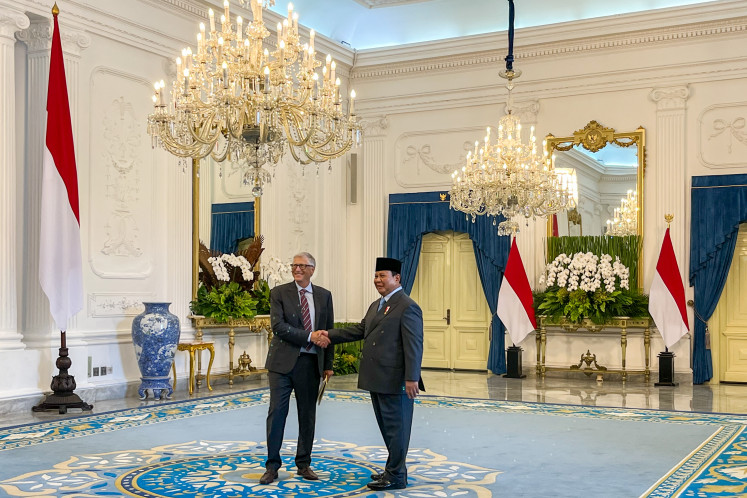Sea, forests important for inclusive growth: Sri Mulyani
In a rare domestic public appearance, World Bank managing director Sri Mulyani Indrawati has laid out her policy recommendations for Indonesia to boost output and improve natural-resource management, the highly respected economist arguing that the country should strive to make its economic growth more inclusive
Change text size
Gift Premium Articles
to Anyone

I
n a rare domestic public appearance, World Bank managing director Sri Mulyani Indrawati has laid out her policy recommendations for Indonesia to boost output and improve natural-resource management, the highly respected economist arguing that the country should strive to make its economic growth more inclusive.
Recent developments in Indonesia, where the current government has placed heavy emphasis on maritime affairs and sea-based infrastructure projects, was 'encouraging' but policymakers could still do better, said Sri Mulyani.
Inefficient fish stock management and illegal fishing lost US$75-US$125 billion of global output annually, she noted, while unreported and illegal fishing led to some $20 billion worth of lost revenues in Indonesia.
'If Indonesia improves governance of the fisheries sector and invests in large-scale maritime transport, it can double fish production by 2019,' Sri Mulyani stated on Tuesday in a keynote speech delivered during the Indonesia Green Infrastructure Summit in Jakarta.
'Average poverty rates in coastal areas are among the highest here. Reversing these developments is essential.'
Sri Mulyani's has been among the names floated to join the government's economic team in the next Cabinet reshuffle. President Joko 'Jokowi' Widodo is reportedly evaluating his ministers as economic growth hovers at a six-year low and the rupiah languishes at its weakest level in more than a decade.
Sri Mulyani was Indonesia's finance minister from 2005 to 2010 before she resigned from her post to join the World Bank, reportedly due to her hostile relationships with politicians.
In her speech, she argued that Indonesia would need a 'leadership that is not afraid to tackle the status quo'. Indonesia has not been inclusive enough, according to Sri Mulyani, and economic expansion has come at the expense of the environment, with major negative implications for future generations.
Sri Mulyani noted that in reality, government agencies were often unaware the extent to which natural resources were being depleted.
In the forestry sector, every year Indonesia loses approximately $4 billion because of illegal logging, while revenues from forestry licensing amount to only $300 million annually, according to World Bank data.
'Conflicting legislation and regulations, overlapping mandates, unwillingness to enforce land use, elite capture, entrenched attitudes and lack of incentives to influence behavior are rife in many resource-rich countries,' she stated.
'Like many countries, Indonesia can transform its decision-making system to be more transparent and inclusive, particularly on resource allocation and use,' she added.
Vice President Jusuf Kalla, who delivered his speech after Mulyani, promised to build more renewable energy-based power plants from hydro to solar to wind power to ensure that the environment was protected, but cautioned that the plan might only be achievable in the long run.
At the moment, he argued, the government had no choice but to develop coal-fired power plants, which are seen as environmentally unfriendly, to meet the country's growing electricity needs.
'The government's 10,000 megawatts of power plant development projects will all come from coal. We decided to take a 'fast-track' approach, given the fact that coal does not need lengthy project research or huge sums of money,' the Vice President said.









